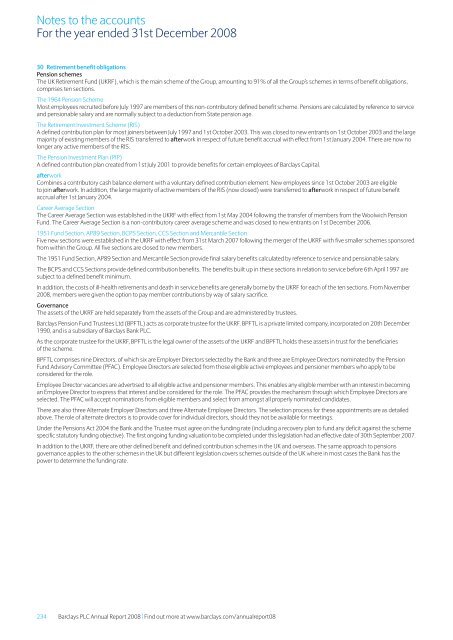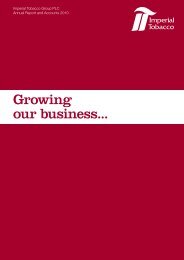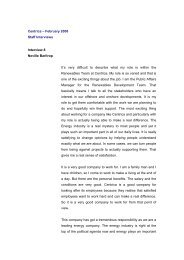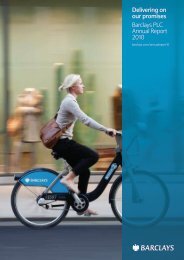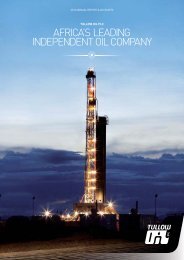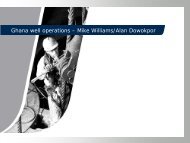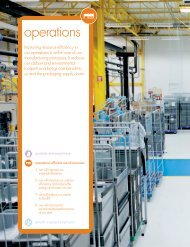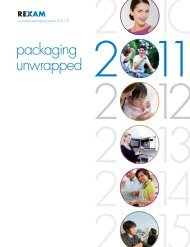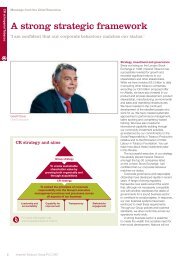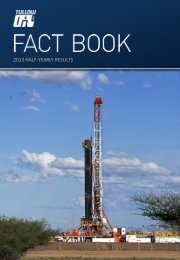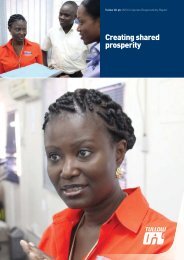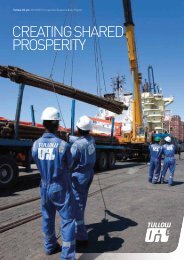Barclays plc - Annual Report 2008 - Financial statements - The Group
Barclays plc - Annual Report 2008 - Financial statements - The Group
Barclays plc - Annual Report 2008 - Financial statements - The Group
You also want an ePaper? Increase the reach of your titles
YUMPU automatically turns print PDFs into web optimized ePapers that Google loves.
Notes to the accounts<br />
For the year ended 31st December <strong>2008</strong><br />
30 Retirement benefit obligations<br />
Pension schemes<br />
<strong>The</strong> UK Retirement Fund (UKRF), which is the main scheme of the <strong>Group</strong>, amounting to 91% of all the <strong>Group</strong>’s schemes in terms of benefit obligations,<br />
comprises ten sections.<br />
<strong>The</strong> 1964 Pension Scheme<br />
Most employees recruited before July 1997 are members of this non-contributory defined benefit scheme. Pensions are calculated by reference to service<br />
and pensionable salary and are normally subject to a deduction from State pension age.<br />
<strong>The</strong> Retirement Investment Scheme (RIS)<br />
A defined contribution plan for most joiners between July 1997 and 1st October 2003. This was closed to new entrants on 1st October 2003 and the large<br />
majority of existing members of the RIS transferred to afterwork in respect of future benefit accrual with effect from 1st January 2004. <strong>The</strong>re are now no<br />
longer any active members of the RIS.<br />
<strong>The</strong> Pension Investment Plan (PIP)<br />
A defined contribution plan created from 1st July 2001 to provide benefits for certain employees of <strong>Barclays</strong> Capital.<br />
afterwork<br />
Combines a contributory cash balance element with a voluntary defined contribution element. New employees since 1st October 2003 are eligible<br />
to join afterwork. In addition, the large majority of active members of the RIS (now closed) were transferred to afterwork in respect of future benefit<br />
accrual after 1st January 2004.<br />
Career Average Section<br />
<strong>The</strong> Career Average Section was established in the UKRF with effect from 1st May 2004 following the transfer of members from the Woolwich Pension<br />
Fund. <strong>The</strong> Career Average Section is a non-contributory career average scheme and was closed to new entrants on 1st December 2006.<br />
1951 Fund Section, AP89 Section, BCPS Section, CCS Section and Mercantile Section<br />
Five new sections were established in the UKRF with effect from 31st March 2007 following the merger of the UKRF with five smaller schemes sponsored<br />
from within the <strong>Group</strong>. All five sections are closed to new members.<br />
<strong>The</strong> 1951 Fund Section, AP89 Section and Mercantile Section provide final salary benefits calculated by reference to service and pensionable salary.<br />
<strong>The</strong> BCPS and CCS Sections provide defined contribution benefits. <strong>The</strong> benefits built up in these sections in relation to service before 6th April 1997 are<br />
subject to a defined benefit minimum.<br />
In addition, the costs of ill-health retirements and death in service benefits are generally borne by the UKRF for each of the ten sections. From November<br />
<strong>2008</strong>, members were given the option to pay member contributions by way of salary sacrifice.<br />
Governance<br />
<strong>The</strong> assets of the UKRF are held separately from the assets of the <strong>Group</strong> and are administered by trustees.<br />
<strong>Barclays</strong> Pension Fund Trustees Ltd (BPFTL) acts as corporate trustee for the UKRF. BPFTL is a private limited company, incorporated on 20th December<br />
1990, and is a subsidiary of <strong>Barclays</strong> Bank PLC.<br />
As the corporate trustee for the UKRF, BPFTL is the legal owner of the assets of the UKRF and BPFTL holds these assets in trust for the beneficiaries<br />
of the scheme.<br />
BPFTL comprises nine Directors, of which six are Employer Directors selected by the Bank and three are Employee Directors nominated by the Pension<br />
Fund Advisory Committee (PFAC). Employee Directors are selected from those eligible active employees and pensioner members who apply to be<br />
considered for the role.<br />
Employee Director vacancies are advertised to all eligible active and pensioner members. This enables any eligible member with an interest in becoming<br />
an Employee Director to express that interest and be considered for the role. <strong>The</strong> PFAC provides the mechanism through which Employee Directors are<br />
selected. <strong>The</strong> PFAC will accept nominations from eligible members and select from amongst all properly nominated candidates.<br />
<strong>The</strong>re are also three Alternate Employer Directors and three Alternate Employee Directors. <strong>The</strong> selection process for these appointments are as detailed<br />
above. <strong>The</strong> role of alternate directors is to provide cover for individual directors, should they not be available for meetings.<br />
Under the Pensions Act 2004 the Bank and the Trustee must agree on the funding rate (including a recovery plan to fund any deficit against the scheme<br />
specific statutory funding objective). <strong>The</strong> first ongoing funding valuation to be completed under this legislation had an effective date of 30th September 2007.<br />
In addition to the UKRF, there are other defined benefit and defined contribution schemes in the UK and overseas. <strong>The</strong> same approach to pensions<br />
governance applies to the other schemes in the UK but different legislation covers schemes outside of the UK where in most cases the Bank has the<br />
power to determine the funding rate.<br />
234 <strong>Barclays</strong> PLC <strong>Annual</strong> <strong>Report</strong> <strong>2008</strong> | Find out more at www.barclays.com/annualreport08


